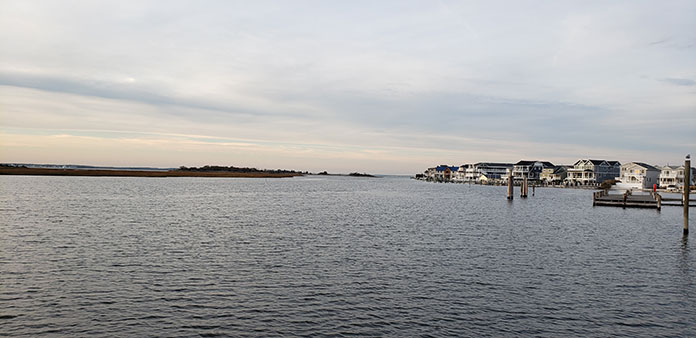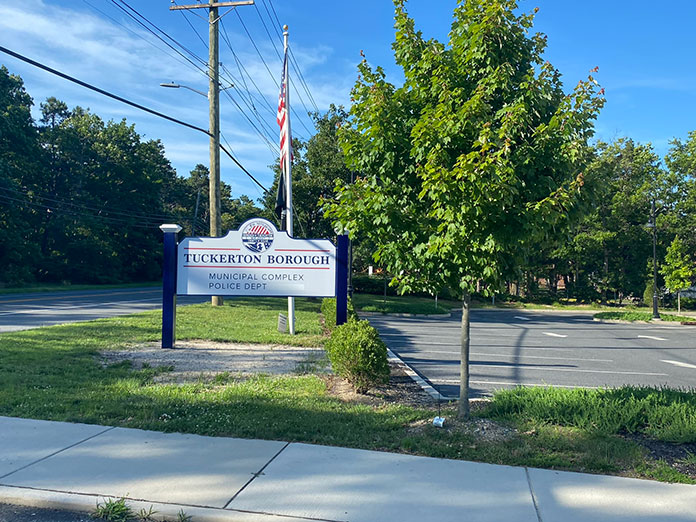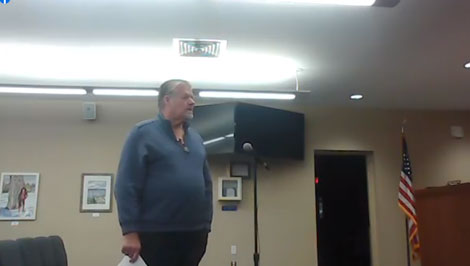
TUCKERTON – A Tuckerton Beach resident waited until the public session of this month’s Borough Council meeting to ask questions regarding people adding to their land by encroaching on the water.
“I have two friends who live in Tuckerton Beach, and both have corner properties of approximately 20-22 feet,” began John Zubriski. “Over the years, people around them have been enlarging their footprints and they can’t even get their boats in.”
Zubriski first confirmed that the Borough’s jurisdiction when it came to homes on lagoons stopped at the bulkheads. He added to his argument by stating his opinion that the Borough had no enforcement rights when it came to dock construction for the waterfront properties.
According to Zubriski, the NJ Department of Environmental Protection (DEP) takes on responsibility for bulkheads and docks. The local homeowner suggested that the Waterfront Development Act contains the specifications that need to be followed for docks and floaters.
“My one friend is in the process of selling his house and called the DEP,” Zubriski said. “My other neighbor five blocks down on the other side of the street also called the DEP and said they were having a problem with the bulkheads.”
The calls to the DEP were intended to get them involved in straightening out the issue as it was outside the jurisdiction of local authorities. Zubriski said his neighbors became frustrated when they were informed the DEP doesn’t do lagoons anymore.
Zubriski wanted to know what remedy a person should seek if another party is encroaching on their water space.
“My one neighbor has his house sold and now has to get into litigation,” shared Zubriski. “He needs this other person to move where they’re supposed to be. You’re not allowed to expand anything out on the water after the year 1981 according to the Waterfront Development Act.”
“You can’t get bigger,” Zubriski continued. “You can get smaller, but you can’t get bigger. You can’t put any steps in.”

Zubriski said he was also confused because Tuckerton charges permit fees when homeowners put in floaters and docks. It didn’t make sense to him since he understood the jurisdiction of local authorities to end at the bulkhead.
However, Borough officials disagreed with Zubriski’s assertions and said that they do not charge permit fees on boating docks. And, when the resident took the argument further to complain that the Borough was taking in additional taxes based on all the new work, Borough Attorney Christopher J. Connors intervened.
“Whether you’re on the Barnegat Bay or on the water,” said Connors. “You’ll admit the market value of waterfront property is much higher, right?”
Connors further explained that bulkheaded property is worth even more. However, Zubriski still wanted to know why his taxes were going up on the other side of the bulkhead.
“A person who has a dock and bulkheads property is worth more than someone whose property has no bulkhead,” Connors continued. “Or half a bulkhead.”
Tuckerton Borough Code Enforcement Officer Jim McAndrew was present during the meeting and attempted to provide Zubriski with some clarification on the initial issue he presented.
“There’s something called the Land Trust doctrine that regulates the water after the bulkhead,” explained McAndrew. “It’s a first come, first serve thing.”
Mayor Susan R. Marshall acknowledged that the DEP acts as the enforcement agency beyond the bulkhead. The DEP conducts inspections by aerial views according to the mayor and compares old and new work with their files.

“If they don’t see a permit for the work,” said Marshall. “Someone goes out and visits your home.”
“The Water Development permit does stay with the block and lot,” Marshall further explained. “If you’re given a Waterfront Development permit for a bulkhead….if you are replacing it in kind, you won’t have to go to the DEP all over again.”
As Zubriski reiterated his original argument that nothing was being done to enforce people who exceeded limits, Connors agreed to further investigate with the DEP.
“If I call them (the DEP) and tell them there are people putting in things that are not supposed to be put in as an example of them not enforcing regulations,” said Connors. “They’re going to come down here.”
After nearly 20 minutes of his back and forth with the Council, Zubreski agreed that Connors’s suggestion was the best course of action.
“What’s right is right,” Zubreski said. “We shouldn’t have to be suing our neighbors.”






